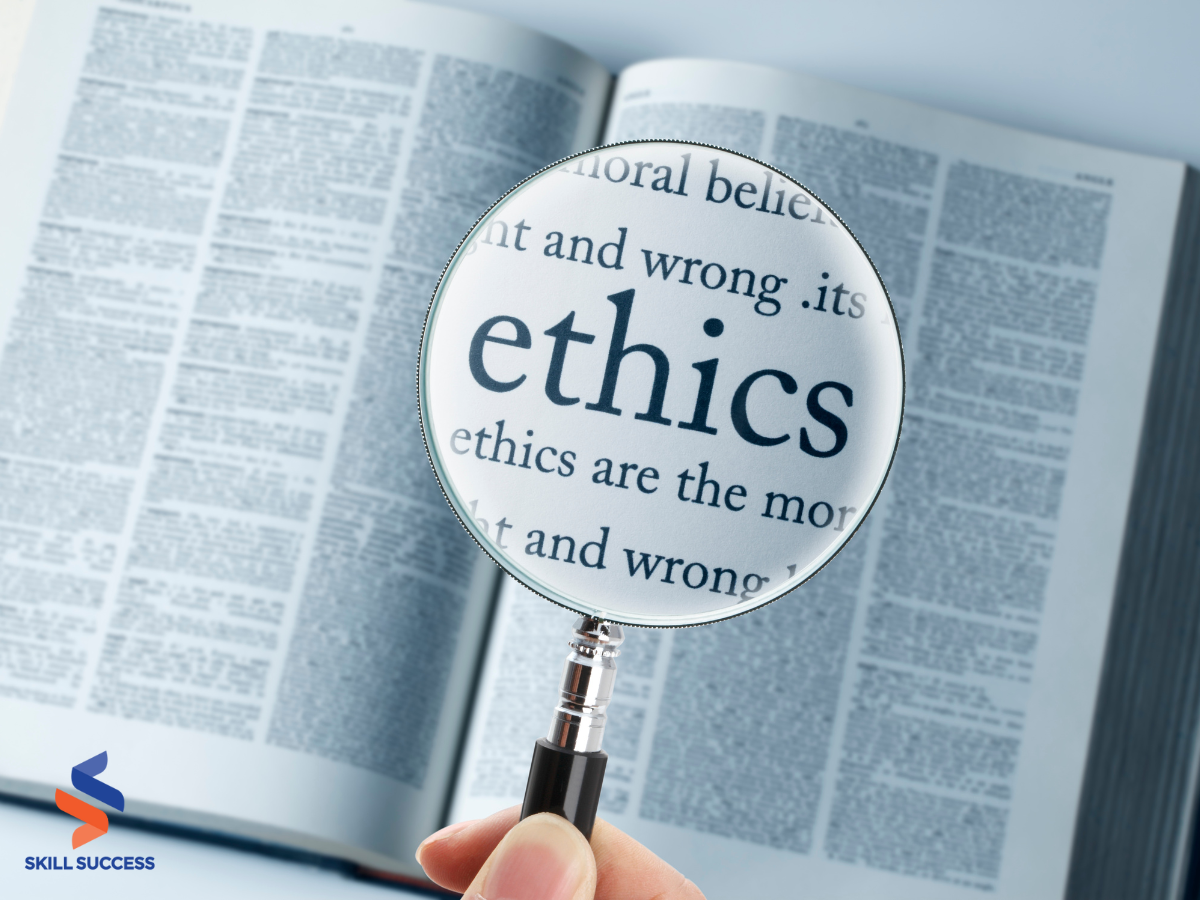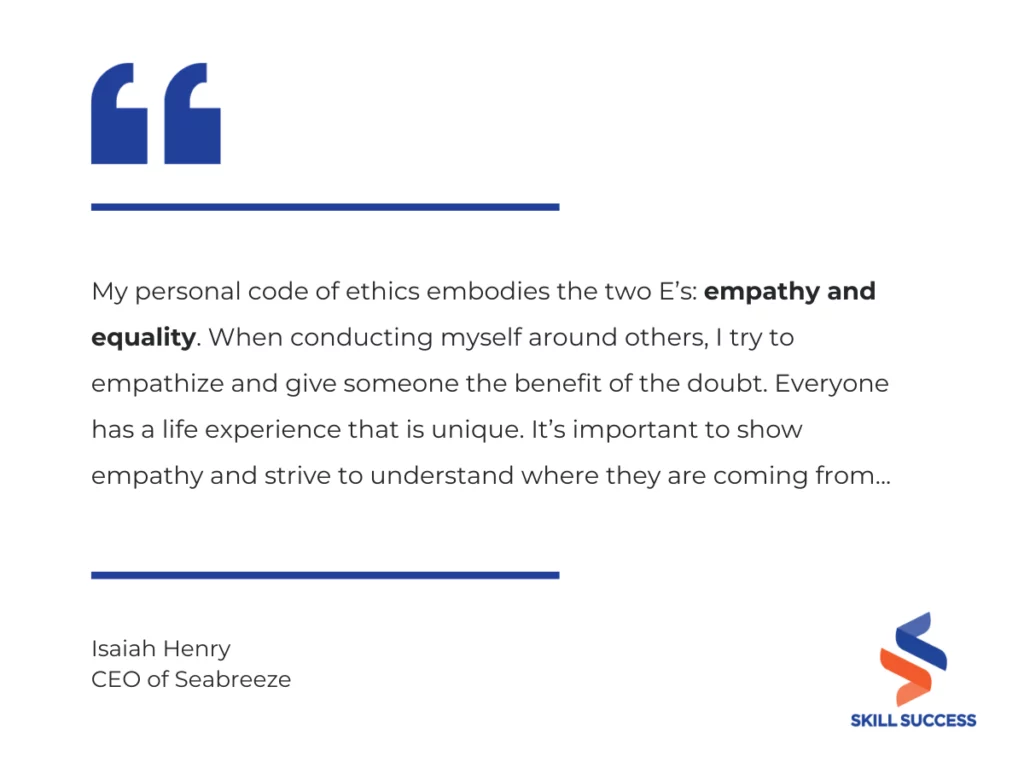In a world where external codes of ethics often shape our behavior, it's essential to remember that your personal values are equally significant. While your workplace may provide a code of ethics outlining professional conduct and expectations, crafting your own personal code of ethics empowers you to align your actions with your deeply held beliefs and ideals.
This blog will delve into the importance of developing a personal code of ethics, offering insights into how it can enrich your life and decision-making process. As you read further, you'll discover inspiring personal code of ethics examples that will help you envision and craft your unique ethical framework.
Join us on this enlightening journey as we explore the profound impact of creating a personal code of ethics in the realm of personal development and ethical living.
What is a code of ethics?
To understand the essence of a personal code of ethics, let us first uncover what “code of ethics” means. A code of ethics is usually a set of principles that a company, organization, or business follows. Its primary purpose is to guide the organization members on how to properly conduct business that is in line with the company values. Usually, these values include integrity, honesty, and professionalism.
Otherwise known as the “ethical code,” an organization’s code of ethics is an umbrella term that covers areas concerning professional conduct. These areas include business ethics, code of conduct for employees, and code of professional practice. Simply put, it ensures that everyone within the organization follows a standard when it comes to ethical behavior in their everyday work.
An organization’s code of ethics may differ greatly from another organization, but in general, they all are similar in the sense that they govern members to do what is right. They are usually under the basis of what is generally accepted by society as right or wrong.
What is the importance of having a personal code of ethics?
If you’re still not convinced that you need a personal code of ethics, below are some key reasons why having one is essential.
It gives you a foundation to help you make big decisions
A lot of people struggle with the decision-making process. If you look towards more successful people and influential leaders in your organization or community, you will find that they have some personal code of ethics that guides them.
A personal code of ethics is particularly important if you are in a position that requires you to make decisions frequently, such as if you are a leader or manager. It will serve as the foundation upon which all of your decisions can stand. You will feel a lot more determined and stand by your decisions with conviction if you know that they are grounded upon your own belief system.
Read more: Decision-Making Tips for Business
It functions as a standard for good behavior
In connection to making good decisions, having a personal code of ethics allows you to make good choices that align with good behavior. Usually, a personal code of ethics is morally aligned to help a person act not only in his own best interest but also in the community or surroundings around him.
It allows you to lead others effectively
A good leader has to be concise, quick to think, empathetic, and have a good moral compass. A personal code of ethics helps you become the most effective leader you could possibly be for the people around you. You don’t necessarily need to be a manager to practice leadership skills. Inspiring the people around you and even self-governance are equally just as important.
It instills a sense of trust in people around you
If you are an effective and moral leader, it will be easier for people around to trust you. Moreover, people usually trust those whom they have similar values with, or whose values they can relate to. If people are aware of your personal code of ethics, they will know exactly how to approach you and what things you may or may not appreciate. This predictability further fosters a sense of trust.
It is a source of self-motivation
Since a personal code of ethics allows you to steward yourself, you will also find that you can motivate yourself. You will find it easier to start projects and finish them on time since you have a sense of accountability towards yourself through your personal code of ethics.
Learn more: What Causes Lack of Self-Awareness

How to write a personal code of ethics
If you agree that having a personal code of ethics is a good idea, here are some pointers to consider when drafting your own code of ethics to serve as your guiding principles:
Why are you writing a personal code of ethics?
The first thing you need to uncover before you even begin is your motivation for writing a personal code of ethics. What do you think is its purpose for you? How do you plan to use it, and why do you think you need one?
Knowing the reason why you are writing a code of ethics for yourself will help you determine where to start as you write it. It will also help you tailor your code of ethics to achieve a specific goal you want to reach or a personal challenge that you want to overcome, similar to that of a personal mission statement.
One way you can determine the purpose of your personal code is through mindfulness. Learn more about how you can use spiritual mindfulness to experience personal growth through this course:
Spiritual Mindfulness: A Powerful Course For Personal Growth
This course helps you build a strong connection with yourself, so you can gain clarity and come to know your true purpose in life. Taught by an experienced spirituality expert, it cuts through the noise of complexity and is delivered in a way that’s easy to understand even if it’s your first time taking a personal development course online.
TAKE THIS COURSEWhat are your top personal traits?
How would you describe yourself? While this question may seem like something you would only hear during a job interview, it is important to ask when trying to determine which values are on the top of your list as you write your code of ethics.
To do this, make a list of the traits or characteristics that strongly define who you are. Examples are kindness, honesty, passion for excellence, prudence, hard work, diligence, and respect for others. Apart from introspection, you may also ask people around you to describe you or see if they agree with your own list of characteristics.
Knowing the personal traits you possess will allow you to create a more honest personal code of ethics that you can stick to with ease because it reflects values that are already inherent within you.
Describe your relationship with others
Another thing you have to consider before crafting your code of ethics is the nature, state, and quality of your personal relationships. Make an assessment of how you relate to those around you, at work or at home.
Coming to terms with the state of your relationships allows you to see areas where you may want to improve. Would you want to communicate better with the people around you? Do you think you should treat others with more kindness? How would you want those closest to you to remember you?
Write a set of statements that you would like to follow
This is the part where you begin to draft your personal code of ethics. Based on the traits that you possess and the relationships you currently have, what characteristics would you like to move forward?
It would help if your statements are to the point and realistic so that you are more likely to follow through.
Set clear guidelines for each statement
A statement alone may not be enough to help you decide whether or not to pursue an activity or behavior. There are a lot of possible grey areas that may surround a specific code. That is why it is important to set clear guidelines that explain each statement in more detail.

Professional versus personal code of ethics
The main difference between a personal and a professional code of ethics is that the former relates to the person’s values in life, whereas the latter relates to the person’s values in the workplace.
For example, a personal code of ethics will let you tell the truth because you believe in honesty and integrity. On the other hand, a professional code of ethics demands that you tell the truth because it is specified in the code of conduct that lying is a misdemeanor in the workplace. Another example is respect. While a personal code dictates that you respect older people, people in service, and the authorities, a professional code dictates that you respect your boss and higher management.
That means that a personal code of ethics encompasses a person’s entire personal life and personal choices while a professional code of ethics is purely related to the rules found within your job.
Incorporating a personal code of ethics into your daily routine using tools like the Notion app can help you stay aligned with your values and maintain consistent ethical standards in your personal and professional life
Personal code of ethics examples from thought leaders
My personal code of ethics is based on a few simple values that are important to me. First and foremost, I value honesty and integrity above all else; being honest and having integrity is the cornerstone of living a good life. I also appreciate compassion, kindness, and respect; I believe that we should all treat others with compassion, kindness, and respect, regardless of who they are or what they have done. Finally, I believe in continuous learning and improvement; it is essential never to stop learning and growing as a person. We should always be striving to improve ourselves and the world around us.
Randy VanderVaate | CEO and Founder, Funeral Funds America
We all have beliefs, and we use those in our personal and career life. As a founder, I have various codes of ethics, but I stick with the influential one, "respect doesn't require a higher social level." I always devote myself to this to bring understanding and stop society's discrimination against those trying to live honorably, even the means of minimum wage income. Let's be open that money and position are not the reason for getting the courtesy we deserve.
April Maccario | Founder, Ask April
A personal code of ethics refers to our values and beliefs that guide our decisions and actions. As a founder, part of my personal code of ethics is to treat others the way I want to get treated. I believe that we cannot demand from others what we cannot give ourselves. So, if we want other people to show us kindness, respect, or other good things, then this is also how we should treat others.
Sonya Schwartz | Founder, Her Norm
My personal statement is inspired by my favorite poem “Desiderata” by Max Ehrmann: I will always speak my truth clearly and calmly and prioritize listening to others. There is always someone better or worse than me, so I will not compare myself with others. I will be doing my work with my heart, and besides a healthy discipline, I will be gentle with myself. There is only one life, so I should live it the best I can. I will be cheerful. I will strive for happiness.
Rafal Mlodzki | CEO, Passport Photo Online
In our lives having high ethics is essential. I have a personal code of ethics that I consider in both my personal life and career. In every part of my daily existence, I constantly maintain my integrity. I understand that integrity is cliche, but believe me it is something that makes a big difference. I constantly exercise integrity because good deeds are rewarded at the end of the day.
Darryl Higgins | Founder, Athlete Desk
For me, a code of ethics is a foundation for effective communication in both personal and professional life. By adhering to the values and principles outlined in the corporate code of ethics, I can better understand the expectations of the people I work with and foster positive relationships with them. A solid code of ethics serves as a framework for making ethical decisions, and that’s where success comes from!
Greg Larnell | CEO, Custom Writings

Recommended Courses for Personal Growth
1. Be Happier With Positive Psychology

This course is designed to provide you with practical, research-based strategies to boost your happiness and well-being. By leveraging the findings from peer-reviewed psychology research, it offers actionable insights that can lead to a more fulfilling and satisfying life.
What sets this course apart is its foundation in rigorous scientific research. Unlike many self-help courses that rely on anecdotal advice, this course distills complex psychological studies into simple, effective life hacks. You'll learn evidence-based techniques that are proven to enhance happiness.
The research in this field is not only compelling but also highly practical. I believe this course can genuinely improve your life by providing tools grounded in real science.
Who is this course for?
This course is perfect for anyone interested in improving their happiness and well-being. If you're curious about the science behind happiness and eager to apply these insights to your daily life, this course is for you.
TAKE THIS COURSE2. Understanding Empathy

This course offers practical, research-based techniques to enhance empathy and interpersonal skills, accessible to everyone without prior knowledge.
Led by an experienced emotional intelligence coach, this course stands out for its actionable, real-world strategies, going beyond theory to provide immediate, practical support.
I believe empathy is crucial for success. This course demystifies empathy, offering tools to improve understanding and connection with others.
Who is this course for?
This course is perfect for anyone looking to develop their empathy and interpersonal skills, whether for professional growth or personal relationships.
TAKE THIS COURSE3. Maximize Life With Growth Mindset

This course provides essential insights into developing a growth mindset, focusing on personal growth and mental health. It equips you with practical tools to achieve your goals faster and live a more fulfilling life.
The course stands out by addressing both mental and physical aspects of growth, offering a comprehensive approach to reducing stress and enhancing well-being. It emphasizes the importance of awareness and mental health investment.
As someone committed to personal development, I believe this course is transformative. It helps you break free from hidden barriers and cultivates a growth mindset, paving the way for significant success and well-being.
Who is this course for?
This course is ideal for business professionals, parents, and students who want to maximize their potential, improve their mental health, and achieve personal growth in every aspect of life.
TAKE THIS COURSEKey Takeaways
Writing your personal code of ethics is a journey of self-discovery. It can be a challenging process, but it is also an incredibly rewarding one. By taking the time to reflect on your core values and beliefs, you can create a roadmap for living a more authentic and fulfilling life.
But the journey of personal development doesn't end here. If you're eager to further enhance your skills and explore a wide range of personal development resources, subscribe to Skill Success All Access Pass. With this subscription, you gain access to our extensive library of courses, including an array of personal development courses that can empower you to become the best version of yourself.
Subscribe now and continue your pursuit of personal development excellence!
Editor's note: This post was originally published in November 2023. It has been updated for freshness and accuracy.

